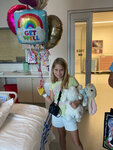
Understanding what to do when encountered with someone suffering from a seizure is the first step in saving that person’s life, and knowing these signs can make a hero out of anyone.
No one understands this more than 10-year-old St. Johns County resident Bryn Jenkins and her friend Mallory.
The two took part in a marine science camp in St. Augustine during the summer, but things quickly went from being fun times to a drastic situation when Bryn suffered a seizure while swimming in a pool during the camp’s first day.
"I only remember a few seconds before I fainted in the water,” Bryn said. “Everything started going black.”
Fortunately, for Bryn the campers were taught how to perform CPR and recognize when someone was in distress.
The techniques learned earlier in the day were suddenly put to use by Mallory, who quickly noticed something was not right with Bryn and dove under to pull her body to the surface and helped her regain consciousness.
Although Bryn's doctors do not believe her seizure led to a cardiac arrest, the quick reaction Mallory demonstrated is something that Bryn and her family are very grateful for.
According to the American Red Cross, about 500,000 cardiac arrests occur each year, and CPR increases the likelihood of surviving cardiac arrest nearly doubles or triples the chances of survival when bystanders act, and the organization encourages everyone, not just healthcare workers and emergency responders to take the CPR course to learn it.
After being notified of the incident, Bryn’s mom, Nicole Jenkins, instructed first responders to transport her daughter to the Wolfson Children’s Hospital Emergency Center at Baptist Medical Center South.
According to Nicole Jenkins, she knew the importance of children being treated by pediatric emergency physicians after spending years with Baptist Health as a content creator for the Wolfson Children's Hospital website.
The incident proved to be much more than just a seizure, as doctors found that Bryn had a rare heart rhythm disorder called long QT syndrome that was known to cause fast and chaotic heartbeats, which can lead to fainting and seizures.
That evening, Bryn was transported to Wolfson Children's Hospital by Kids Kare helicopter and admitted to the Cardiovascular Intensive Care Unit (CVICU) in the Borowy Family Children's Critical Care Tower, where an EKG and genetic testing confirmed the diagnosis.
"Her heart rate was all over the place. Even with her sitting still, it would go down to 35 beats per minute and then up to 120,” Nicole Jenkins said. “It's crazy to know her heart has probably been doing that her whole life without us knowing.”
Wolfson Children's C. Herman and Mary Virginia Terry Heart Institute is the only program in Jacksonville that provides a full range of cardiac services for adults and children like Bryn with congenital heart disorders. This includes outpatient evaluation of murmurs, detection of complex heart defects in fetal life and imaging and non-surgical procedures to diagnose and treat heart conditions.
"Pediatric electrophysiologists and interventional cardiologists associated with the Terry Heart Institute perform procedures on children with significant heart conditions and adults who need surgical correction of defects that they were born with,” said Dr. Rajesh Shenoy, a fetal and pediatric cardiologist and medical director at Wolfson Children's Terry Heart Institute.
Bryn remained in the CVICU for observation for 10 days before undergoing a procedure to receive an implantable cardioverter-defibrillator, a life-saving device that acts as a pacemaker and a defibrillator to fix fast, abnormal heart rhythm.
Along with starting lifelong medication to help keep her heart rate stable, she had to wear an arm sling for several weeks after surgery to reduce movement around her incision.
While activities like sports and physical education classes are on hold, Bryn started her first year of middle school this fall and feels like herself again.
"I feel totally fine and back to normal," she said.
Bryn will continue yearly visits with the electrophysiology team at the Terry Heart Institute to monitor her progress and remains grateful for the care she continues to receive so close to home by the staff at Wolfson Children's.